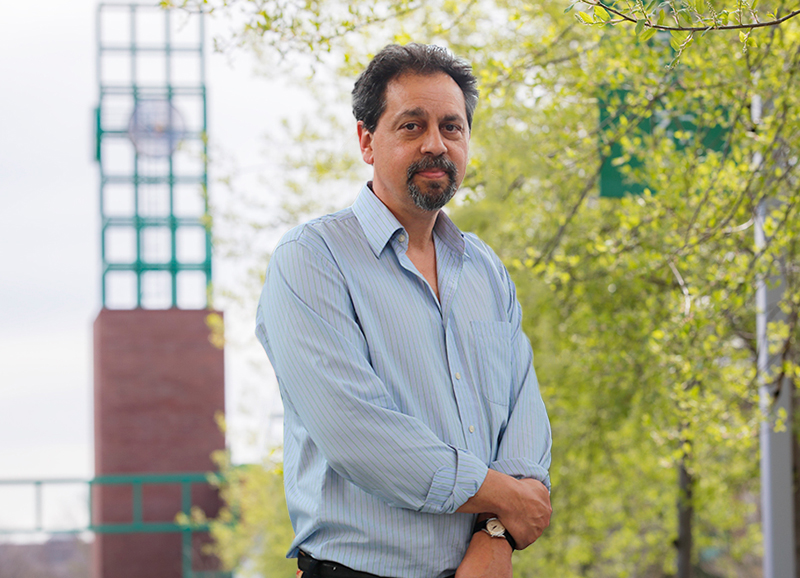Professor’s talk examines international criminal law

According to Max Pensky, international criminal law holds an important place in protecting human rights — but it needs to adapt to the changing climate of today’s world.
“International criminal law has not yet moved into its own future,” Pensky said. It remains tethered to the increasingly indefensible view that the best international law will be the one that most closely resembles familiar practices from a small sample of national legal cultures.”
Pensky is a professor of philosophy and a co-director of Binghamton’s Institute for Genocide and Mass Atrocity Prevention. His lecture, “Is the Battle Against Impunity Worth Winning?” was part of the Harpur Dean’s Distinguished Lecture series, which took place on Nov. 8 in Old Union Hall. Harpur Dean Elizabeth Chilton introduced Pensky.
Pensky spoke about the importance of international criminal law and the fight against impunity.
“The United Nations has adopted the anti-impunity norm as one, if not the most, important yardstick in the global effort for enforcing and protecting basic human rights,” Pensky said. “And yet, given the wide dissemination of the idea and adoption of the anti-impunity norm, what’s odd is that the meaning of the term ‘impunity’ is completely unclear.”
Impunity can be loosely defined as wrongdoers escaping justice and accountability for their actions. However, Pensky said its vague definition can pose a problem about how criminals are punished for their crimes.
Pensky said other problems international criminal law faces is that justice can be slow-moving, costs are high, and there is no real model for international criminal court. It differs widely from domestic criminal courts.
“International criminal law’s slackening momentum is part of a realignment of very deeply entrenched institutions, and shifting attitudes towards what states can and should do regarding the new category of international crimes,” Pensky said. “The major motivation for my talk today is that somewhere reflection is needed on how ICL’s arc of progress can be given more momentum, or possibly saved.”
Pensky believes that international criminal law is something that can and should be saved. To do so, he said that changes must be made.
“Criminals should be punished because it’s what the criminal deserves,” Pensky said. “Punishing criminals increases social benefits and reduces social ills more effectively than any other available remedies for much less costs. However, giving very bad people what they deserve may very well scratch a very deep itch for moral reciprocity, but there are some compelling reasons why international criminal law isn’t the best suited to give these criminals their just desserts.”
According to Pensky, part of this problem is a broad definition of what impunity means.
“With the broadness comes a lack of precision,” Pensky said. “It burdens the value of impunity with the task of articulating a coherent range of responses to atrocity violence, but it does so in a way that is much too indeterminate to know what minimally must occur legally and extra-legally for a legal authority to discharge its obligations, for the perpetrator to get what he deserves, and for a recovering society to maximize its chances of just peace.”
To make this definition more specific, Pensky said the topic of accountability needs to be addressed. Sanction accountability is part of this, and deals with placing limits on those in power.
“Sanction accountability focuses our attention on the focuses or outcome of an accountability procedure, but it says little or nothing about what that procedure is,” Pensky said.
On the other hand, deliberation accountability can put more emphasis on the process itself of justice.
“Deliberation refers to the irreducibly inter-subjecting process of the giving and taking of reasons as a core requirement for duly assigning accountability,” Pensky said. “Being accountable to someone or something means being prepared to give an account of yourself, to be answerable for what you did or why you did it.”
According to Pensky, using these two approaches together may solve some of the issues that international criminal law faces about how to make criminals accountable for their crimes. If this is done, international criminal law has a better chance of withstanding the future.
“A determinate broad impunity norm would exist in a coordinated legal and political approach whose policies consciously intend to maximize accountability across both the deliberative and the sanction-based terms of accountability,” Pensky said. “Individual persons are to be held accountable for what they as individual persons actually did, not for the ideals or groups that they symbolize or represent.”
